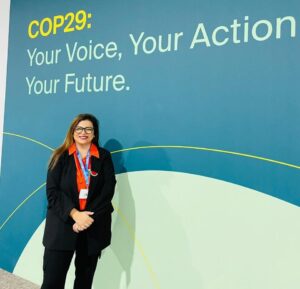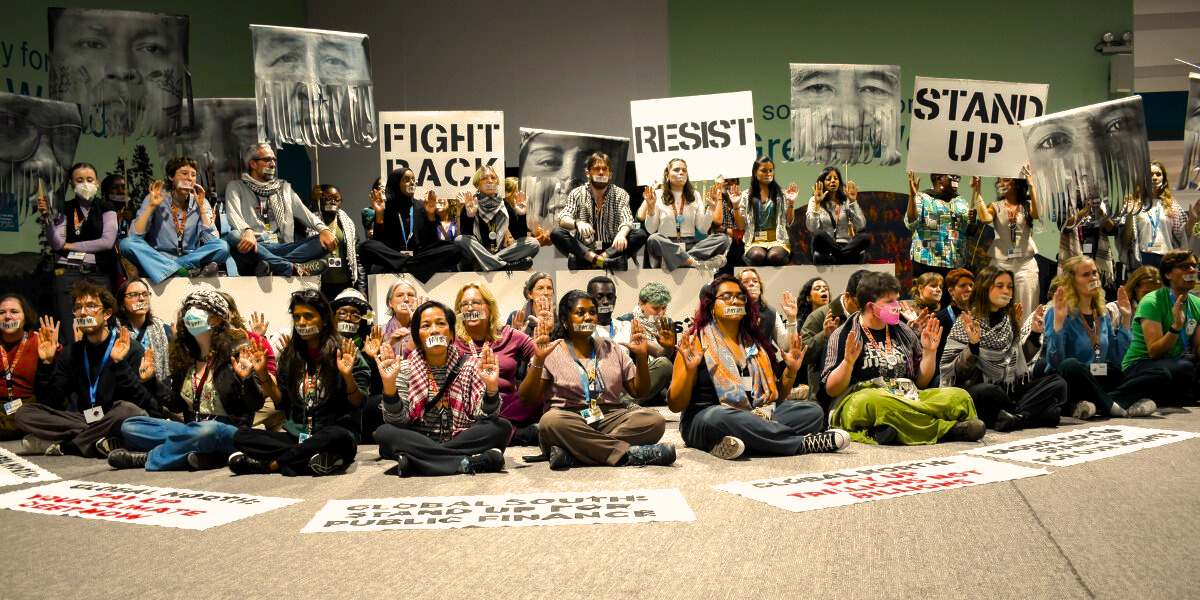The Finance COP has ended, but its impact will reverberate for years. History, and the judgment of future generations, will reflect on those who had the power to act yet chose not to. As nations debated the New Collective Quantified Goal (NCQG), the glaring inequities of global climate negotiations were laid bare. Despite clear objections from many countries, especially the global south who are at the frontline of the crisis, the COP presidency pushed forward unilaterally, imposing decisions that protect the rich and powerful and disregard the vulnerable. This wasn’t a mistake—it was a deliberate strategy to maintain dominance and shield entrenched interests.
Don’t Be Fooled by the $1.3 Trillion “Breakthrough”
The $1.3 trillion climate finance target has been hailed as a “historic breakthrough.” But this celebration is misleading. For the Global South, this is not a victory; it is a distraction cloaked in inflated promises and devoid of accountability.
Rather than addressing the structural inequities of climate finance, wealthy nations have shifted attention to grandiose figures that mask their unwillingness to take responsibility. The $1.3 trillion is a facade, ignoring the root issue: the refusal of developed nations to provide equitable, accessible funding or acknowledge their historical emissions. Instead, blame is conveniently deflected onto “geopolitics” or the alleged resistance of developing countries.
Even more concerning, this figure lacks clarity on how the funds will be mobilized. With private financing and multilateral development banks (MDBs) at the center, the focus shifts to profit-driven mechanisms. These impose austerity measures, deepen debt, and prioritize private investment and profit. The applause for this target is hollow, leaving the most vulnerable nations to shoulder the climate and financial burden. The real number in the text from developed countries is $300 billion annually, incorporating loans, far from the 1.3 trillion in public grants finance needed made and far from what organizations like Oxfam have called for, 5 trillion in climate debt and reparations.
Shifting Blame and Pushing Profit-Driven Finance
A key tactic during COP negotiations was to frame developing countries as obstacles to progress, diverting attention from the true culprits: historical emitters and exploitative economic systems. This narrative ignored calls from the Global South for fair, transparent processes and sufficient financial support.
An especially insidious move was the push to expand the contributor base, shifting financial responsibility onto countries already struggling with climate impacts. This was presented as a “compromise” to secure higher funding numbers but came with strings attached reliance on private financing and MDBs as primary mechanisms. Rich countries don’t have the moral upper ground to demand this when they haven’t even fulfilled their commitment to provide 100bn per year to developing countries between 2020 to 2025. Instead of reflecting on their repeated failures, they chose to deflect their responsibility on others and change the narrative and focus.
Private financing is driven by profit, not equity. Mitigation projects, which offer returns on investment, are prioritized over adaptation and loss and damage, which are less profitable but essential for vulnerable nations. Furthermore, private financing or actors are not part of the UNFCCC process and there is not accountability mechanism that can be applied to them. Moreover, MDB funding often imposes debt burdens and austerity measures, exacerbating economic challenges and trapping nations in cycles of dependency. In 2019 -2020, , an estimated 80% of non-concessional finance, market rate and likely debt crippling, was provided via MDBs.
The Hidden Costs of COP for the Global South
The injustice extends beyond the negotiation table. Attending COP has become prohibitively expensive for many Global South countries. The costs of travel, accommodation, and logistics force nations to stretch already limited budgets just to participate meaningfully. While the rich countries countries individually can afford to send delegations in the hundreds to follow each negotiating article, developing countries even collectively as a negotiating bloc don’t have this luxury.
This year, many nations made sacrifices to send larger delegations, knowing the stakes were too high for minimal representation. Yet even this effort was manipulated. Negotiations were extended beyond the official timeline, exhausting delegates, and straining resources. Some countries, unable to bear additional costs, had to leave before critical decisions were made. This exclusion was no accident—it was a calculated strategy to consolidate power in the hands of wealthier nations.
The Impact on Global Stocktake and NDC Ambitions
These inequities come at a pivotal moment for global climate action. Under the Paris Agreement’s CMA, countries are required to submit updated and more ambitious Nationally Determined Contributions (NDCs) by February. But the failures at COP send a demoralizing message: How can nations, already marginalized and stretched thin, raise their ambitions when the system offers no support?
Instead of fostering trust and collaboration, the NCQG negotiations have widened the gap between ambition and action. The reliance on private financing sidelines the real needs of developing countries, leaving adaptation, loss, and damage underfunded. This dynamic undermines the Global Stocktake process, which is meant to serve as an accountability mechanism but instead fuels frustration and disillusionment.
Uniting for Resistance
Amid these injustices, one source of hope shines through: solidarity. Over the past two weeks, civil society and the Global South have demonstrated unprecedented unity. Together, they’ve resisted efforts to divide and conquer, exposing the manipulations of powerful nations and fossil fuel interests. This unity must serve as the foundation for the fight ahead.
What Must Be Done?
- Let’s be clear about the issue at hand: the climate crisis is about inequality and injustice. Rich countries are largely responsible for the climate crisis, while poorer countries have done the least and are the most impacted. This must be the basis for any negotiations, recognizing that there are culprits and victims. The rich polluters must be held accountable. Their colonial legacies are not just in the past; they continue to affect the economies and environments of poorer countries today and, if left unaddressed, will continue to do so into the future. Challenge Profit-Driven Financing Models: Climate finance must prioritize equity over profit. Public funding and grants—not debt-laden private finance—are essential for meaningful action.
- Demand Transparency and Fair Play: COP processes must be reformed to prevent the deliberate exclusion of developing countries.
- Amplify Global South and Civil Society Voices: The unity shown at COP must grow into stronger coalitions to counter the dominance of wealthier nations.
- Raise Ambitions for NDCs: Despite the frustrations of this COP, countries must push forward with ambitious, fair NDCs to secure the future of global climate action.
- Hold Polluters Accountable: Wealthy nations and fossil fuel corporations must be held directly responsible for their contributions to the climate crisis.
A Call to Action
What we witnessed at this COP wasn’t just a failure of negotiations—it was a failure of justice. But while the powerful may have secured a short-term victory, the fight is far from over. From the halls of Bonn to grassroots movements worldwide, the struggle for climate justice continues.
We have no choice but to persist. Persist for the millions of lives at risk. Persist for the future of our children. Persist for the survival of our planet. This fight is about more than climate finance—it’s about justice, equity, and humanity.
Let the frustration of this COP fuel our determination. Let the manipulations of the powerful strengthen our resolve. Together, we will resist. Together, we will rise. This fight is not only about climate—it is about dismantling systems of war, militarization, and profit. And together, we will win.

Safa’ Al Jayoussi (She/Her)
Interim Global Climate Lead, Oxfam International
Accomplished and internationally recognized Environmental Advocate and Climate Justice Expert with over 15 years of experience in the civil society field. Having created and implemented major programs & campaigns and founded many networks and coalitions that serve different causes, including the “Climate Action Network Arab World”. With a track record of engagement in climate change negotiations since 2008 as an official observer under the UNFCCC, Safa’ has become a reference for Arab World climate policy to international networks and organizations working to promote government and individual actions to limit climate change. Currently, Safa’ serves as the interim Global Climate Lead for Oxfam International and prior to that was the Climate Justice Advisor for MENA at Oxfam International, where she is responsible for developing and advancing a regional climate justice strategy and serving as a focal point for program, advocacy, and campaigns across the region, and within the wider global movement


